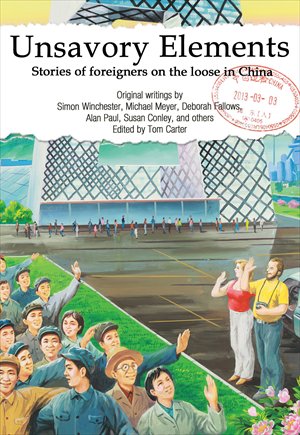The expat diaries


In Beijing, there's a fair amount of self-segregation among expats, for better or worse. English teachers hang out at this open mic, journalists tip back in that hutong, entrepreneurs prowl for new contacts at those clubs.
A new anthology wrangles together expats from every dive bar and KTV of the China experience - imprisoned hash smuggler, kung fu wannabe-in-training, family man on holiday, compass-less vagrant - and puts them in a tight scrum called Unsavory Elements, released by Earnshaw Books last Friday. The 28 authors within this paperback's covers include bestselling authors such as Peter Hessler (Country Driving) and Jonathan Watts (When a Billion Chinese Jump) right alongside the first-time published Matt Muller, who currently works as an English teacher in Sichuan Province.
All the authors contributed new works, save for the exemption-worthy Hessler, whose "View from the Bridge" - the standout piece for me due to its beautifully direct writing - was originally a New Yorker essay. The stories from front to back flow along a meaningful trajectory, starting with the questions of morality that arise for expats when first propositioned with a murky business opportunity and ending with the questions of morality that arise when helping a friend proposition hookers on his way out of China.
But it's not all unsavory bits - these essays have heart. From Urumqi to Shanghai, these foreign devils just can't help but smile at what China has taught them.
There are many moments expats can instantly relate to, like the drama of buying vegetables, the odd sight of gangly teenage security guards and the baijiu - oh, the baijiu. Erguotou expert Derek Sandhaus (the man behind the 300 Shots blog) delivers the most eloquent descriptions of the clear stuff as a "sweet sorghum hooch" and the cousin of both "rose essence and paint thinner."
Muller, the English teacher, explores his "impulses as a single white male in China." It's just as crude as you'd imagine, but tackled gracefully and all around a captivating yarn. His is the first reference to sex in the book - a shocking fantasy he has of performing sexual acts on his Chinese co-teacher while in front of a room of high school students.
The bulk of the essays, though, address sex from the confines of loving relationships, though they are revealing in new and exciting ways, too.
Jocelyn Eikenburg gives insight into the seldom spoken of (or seen) relationships between foreign women and Chinese men in "Red Couplets." She writes, "From the first time I started to love a Chinese man, hiding became part of my life." As she watches droves of Western men couple up with Chinese women, she feels alienated by her expat girlfriends, too, who openly express their romantic disdain for all Chinese men. In a past age, her girlfriends' blunt commentaries about their preferences for partners would have been edgy, but in the global, expat realm, they are the close-minded and cruel characters of the story.
Closing out the book is the anti-palette cleanser and eponymous essay by the anthology's editor, Tom Carter. His piece takes on not the illustrious reporters who engage the locals in their astonishingly fluent Putonghua, but the "grunting and gesturing" ex-pats that inhabit "New China: a refugee camp for the world's losers." And, one more thing - they're haggling for teenage prostitutes.
Carter keeps a little distance, thankfully, and abstains from the affair, but commits an incongruous lapse in judgment as he backs up his drunken friend's right to haggle. "He had unwittingly raised a valid point," Carter writes. "100 yuan was an obscene amount of money compared with what grade-school dropouts earned toiling in some factory." In Carter's native US, that currently amounts to $16, a fact the essay even acknowledges. Additionally, a sex worker may get but one customer a night, wages only drop with age and the hazards of the job may come at a cost later down the line. Carter mercifully keeps his indiscretions to only that one, and later artfully slips in his sole line of commentary on China: "A slender creature who had trouble walking in her platform heels … like a developing China struggling to cope with its own self-imposed modernization."
A few finer details plague the book. Typos mar one of the essays submitted closer to deadline. At its Beijing launch during the Capital Literary Festival, no copies were available for purchase due to some legal restrictions, though Carter says the book will soon be available in local bookshops and on Amazon.
But as a collection of thoughtful and literary essays, the anthology succeeds in inspiring all those expats asking themselves why they came here to dig deeper and never stop exploring this exhilarating land of opportunity.